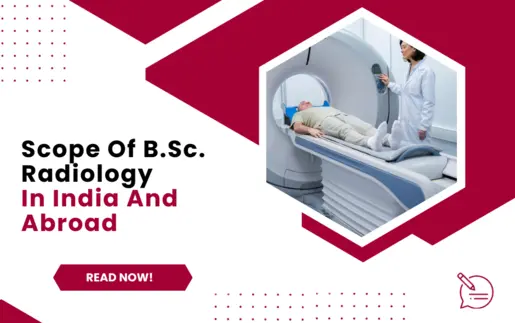Exploring the Career Scope of Bachelor Of Medical Laboratory Science
Medical laboratory science is a crucial component of the healthcare sector since it provides the foundation for precise illness diagnosis and therapy. Students who earn a Bachelor of Science (B.Sc.) Medical Laboratory Sciences are prepared to work in clinical laboratories, research organisations, and diverse healthcare settings. This comprehensive degree provides many job prospects, enabling graduates to significantly influence patient care and public health. This blog will discuss the fascinating employment opportunities available to those who seek a BSc in Medical Laboratory Sciences.

Understanding Medical Laboratory Science
Understanding the function of medical laboratory science is crucial before delving into career opportunities. Medical laboratory scientists, also called medical technologists, perform different diagnostic procedures on patient samples such as blood, urine, tissue, and other physiological fluids. These tests assist medical professionals in accurately diagnosing, monitoring, and treating medical disorders.
Career Opportunities
Clinical Laboratory Technician/Technologist:
B.Sc medical lab technology offers you to work as a technician or technologist in hospitals, diagnostic facilities, and private laboratories. It is one of the most popular job pathways for holders of a B.Sc. in medical laboratory science. They perform a critical role in patient care by doing tests, analysing the data, and communicating their findings to doctors.
Research Scientist:
Bachelor of medical laboratory science who is interested in employment in medical research can increase both medical knowledge and medical technology. Researchers research novel diagnostic approaches, create ground-breaking therapies, and conduct studies to enhance healthcare results. They operate in academic institutions, pharmaceutical firms, and governmental organisations.
Public health officer:
Graduates of the B.Sc. programs in medical laboratory science can work in public health agencies to support disease surveillance, outbreak research, and preventive measures. They are essential in keeping an eye on infectious diseases and preserving community health and safety.
Quality Assurance Specialist:
Bachelor of Medical Laboratory Science graduates can work as quality assurance specialists in labs and healthcare institutions. Quality assurance is important in the healthcare industry. They ensure that lab procedures adhere to legal requirements and that testing is accurate and precise.
Biomedical Equipment Sales and Support:
Graduating students may seek professions in the sales and support of diagnostic tools and biomedical equipment. They collaborate closely with healthcare professionals, assisting them with technical decisions and equipment selection.
Forensic Science Technician:
Those with a passion for criminal justice may pursue a profession in forensic science by earning a B.Sc. in Medical Laboratory Science. These experts examine data gathered from crime scenes, assisting in criminal investigations and presenting results in court.
Molecular Biologist:
Graduates in medical laboratory science with a strong interest in genetics and molecular biology can get into molecular diagnosis. They investigate DNA and RNA using cutting-edge methods, assisting in detecting and managing genetic abnormalities.
Infection Control Specialists:
These professionals focus on preventing and controlling infections related to medical care. To keep a safe workplace for employees and patients, they develop protocols, monitor and instruct healthcare professionals on best practices.
Opportunities for Advancement
A stepping stone for career advancement is a B.Sc. in Medical Laboratory Science. In fields including medical laboratory management, public health, biomedical science, or healthcare administration, graduates can pursue master's or doctoral degrees. In academia and industry, these advanced degrees present prospects for leadership positions, research positions, and higher-paying careers.
Healthcare Effects
The basis of the healthcare system is medical laboratory science. This industry's experts offer vital information that promotes the early diagnosis and treatment of diseases, improving patient outcomes. Medical laboratory scientists play a crucial role in enhancing the standard of care and patient safety by identifying pathogens, assessing the efficacy of treatments, and assuring the safety of blood transfusions.
B.Sc. Medical Laboratory Science: Top Recruiters
Some of the leading hospitals and laboratories recruiting medical lab scientists are:
- Forensic Science Laboratory
- AIIMS
- Apollo Max
- Fortis
- Columbia Asia
- Referral Hospital
- BLK Super Speciality Hospital
- Lilavati Hospital
- Manipal Hospital
Salary for a Bachelor of Medical Laboratory Science
Following is a list of some of the well-liked positions available to successful MLS graduates, along with those positions' typical yearly salaries:
Medical Record Technician with a BSc Medical Lab Technology Makes an Average Annual
- Salary of INR 4.3 Lakhs
- Medic: 5.12 lakhs Indian rupees
- Manager of a Laboratory: INR 2.5 Lakhs
- 2.07 lakhs for a lab assistant
The BSc Medical Lab Technology program at CGC Jhanjeri's highlights include
Clinical laboratory examinations can be used to learn about illness diagnosis, treatment, and prevention. Teaching that is integrated across therapeutic topics or illness stages. Obtain practical laboratory skills through experiential study; acquire hands-on experience through internships in reputable labs and hospitals and visit state and central labs. Make the correct choice, then, and enrol in an institution that offers a B.Sc. in Medical Laboratory Science program that emphasises research!
Admissions to the Bachelor of Medical Laboratory Science
Colleges and universities provide a merit-based or cut-off list for admission to B.Sc. MLS programs. Few private schools and institutions provide direct admission based on grades from the 12th grade. Admissions open at CGC Jhanjeri for B.Sc. Medical Laboratory Sciences, one of the Top and Best B.Sc. Medical Laboratory Science Colleges in Punjab and Chandigarh
Conclusion
A B.Sc. in Medical Laboratory Sciences provides a variety of job options in the medical field, as well as in research institutions and public health agencies. Graduates have various career options, including positions as research scientists, public health officials, and clinical laboratory technologists. Additionally, this sector offers additional degrees for greater specialisation and job advancement. Medical laboratory scientists significantly impact patient care and public health by helping diagnose, treat, and prevent diseases. This solidifies their status as unsung heroes of the healthcare sector. The demand for knowledgeable medical laboratory workers will only grow as technology and healthcare continue to advance, making this a potential and lucrative career choice for aspirant students.
FAQ
What subjects do a bachelor's degree in medical laboratory science cover?
You can work in pathology labs, urology labs, and blood banks if you have a Bachelor of MLS. You can work at hospitals, pharmaceutical companies, and research institutes. By working as a lecturer in a college, you can also pursue a career in teaching.
What level does medical laboratory science fall under?
Undergraduate study for the Bachelor in Medical Laboratory Science lasts three years. Disease diagnosis and therapy provide both theoretical and practical knowledge. Laboratory tests are used to diagnose illnesses.
Can a doctor obtain a degree of BSc in MLT?
You can, indeed. The Medical Common Entrance Examination is required of you. Remember that having a medical laboratory science degree won't help you get into the MBBS program.
Is BSc MLT a worthwhile major?
BSc MLT is a wonderful job choice for a bachelor's degree in B.Sc medical laboratory sciences.



















